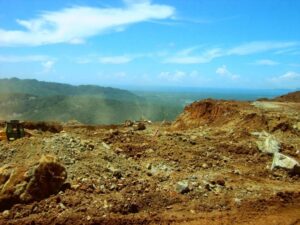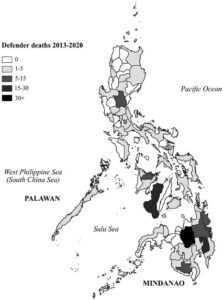This blog was written for the RSA Blog Student Summer Series that will highlight graduate student success in regional studies across the globe throughout the summer.
The master’s tools will never dismantle the master’s house ~Audre Lorde
From colonialism to market-based economy, capitalism has wreaked havoc of unimaginable scale. Largely driven by a quest for profit, this system operates in the logic of endless expansion in a finite world, specifically in countries outside the Western borders.

In photo: Mining site in Surigao del Sur, Philippines
A plethora of decolonial scholars contend that the Global North was constructed by extracting and capitalizing the Global South. This has been in place since the enslavement of the SWANA region (the decolonial term for the Middle Eastern, Near Eastern, Arab World or Islamic World used to refer to the countries in the Middle East and North Africa (MENA) continent. It is short for South West Asian/North African) in building the Graeco-Roman empire, the invention of transatlantic slavery and the importation of human beings for labor primarily by England, as well as the excavation of vast continents – from the Americas to the Southeast Asia. In the realm of business and entrepreneurship, capitalism can be coated in the notion of advancement and modernity that deliberately erases the long history of colonialism and violent processes of on-going coloniality.
Neoliberal education
Deeply tethered to its neoliberal underpinnings, Farhana Sultana contends that the Western orientation of academia continues to perpetuate Eurocentric ideas and knowledge production. This is accomplished by concealing the racial forms of domination and ignoring more than 500 years of colonial injustices. Business pedagogies suffer the absence of relevant topics: for example, the genocide of the indigenous populations in the Americas in 1500s and its relation to the expansion of capital is largely missing in mainstream discussion. Moreover, the enslavement of human beings, extraction of lands for gold, silver, cotton and sugar, and its decisive role in the development of the 20th century capitalism are also excluded from the entrepreneurial discourse.
Business academies are complicit to capital. In the global scale, the movement of capital and the absurd confinement of people of color within certain territories were – and still are – the chief reasons for invasion, material extraction, labor exploitation, and market expansion. A stable supply of resources is needed to ensure the continuous generation of profit. The 2019 report by the United Nations Environment Programme and the International Resource Panel found that the demand for global resources specially biomass, fossil fuels, ores, and non-metallic minerals drastically increased from the 1970s to 2017. These processes led to about 50% of greenhouse gas emissions in the atmosphere and the uneven distribution of climate vulnerability and environmental impacts across space and time. For instance, quantifying the historical contribution to climate change of countries around the world, Jason Hickel found that the Global North is disproportionately responsible for 92% of CO2 emissions. However, the burdens of climate crises are immensely saturated in the Global South despite being in their boundary fair shares at 8% emissions, and without any significant material reparation from the former.
Decolonizing business and development
In the Philippines, the core principle of contemporary business and development is firmly entrenched in profit-oriented approaches that grow capital and dispossess the many. Progress is conferred with favorable notion and exploitative industries continue to masquerade as local employment and economic opportunities. This excludes the fact that Philippines is considered the deadliest country, among others, for environmental defenders in Asia. Actually, scratch that: Philippines is a deadly country to anyone who is not a member of its elite class. Excluding the unrecorded killings, it has at least 29 documented murders among the ranks of environmental defenders in 2021. On top of this, thousands were slaughtered among the poor, indigenous groups, and structurally-disadvantaged communities in the name of development.

Source: Dressler & Smith, 2022
Instead of fostering a more humane and participative space base on situated knowledges and grounded praxis, business academies in the Philippines serve as efficient avenues that bolster capitalism and obscure the country’s long history of colonization, agrarian violence, and ancestral dispossession. Citing the work of Paulo Freire, Farhana Sultana calls for the use of critical pedagogies in academia to counter these conditions. Political struggle, global social justice, and the obligation to redress inequities and colonial injuries should occupy the center of the discourse.
A radical shift on the power and agency to determine the social realities in the margin is crucial in decolonizing the field. From the elites who command the infrastructure of profit-making, the platform must be given to those who bore and suffer the brunt of exploitation, land and resource appropriation, as well as transgenerational injustices. Business academies should go beyond dividends and financial maximization. It should begin tackling the brutal history of racialized capitalism and on-going coloniality, especially in formerly colonized countries.
Moreover, these venues should open a fertile terrain to foster cross-border solidarities where the problematic notion of capitalist redemption through equally problematic notion of progress should be interrogated. By redesigning business pedagogies, collective responsibility and ethics for our multi-species world should be given the focal point and highest priority.

Jonalyn Paz is an Independent researcher in the Philippines currently based in Turkey.
Are you currently involved with regional research, policy, and development? The Regional Studies Association is accepting articles for their online blog. For more information, contact the Blog Editor at rsablog@regionalstudies.org.